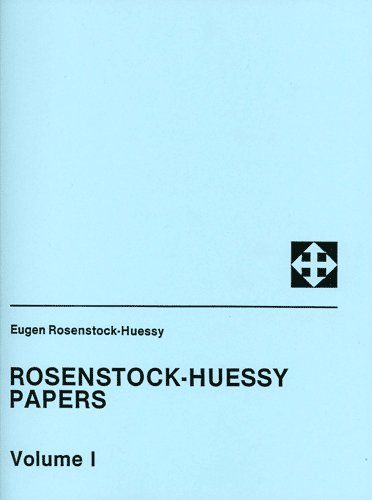Rosenstock-Huessy Papers, Volume I

Rosenstock-Huessy Papers, Volume I is a feast of ideas in nine essays. Although these essays make diverse and delightful digressions, the volume primarily addresses three topics: science, education, and religious discourse. Several of these essays have appeared in the two German books, Der Atem des Geistes (The Breath of the Spirit) and Die Sprache des Menschengeschlechts (The Speech of Mankind).
Rosenstock-Huessy describes the progress of scientific knowledge as a human social endeavor, rather than as a search for proper methods or as the product of lone genius. Human beings take up particular roles and positions relative to others in the process of inquiry hence, Michael Faraday was a “classic” and Paracelsus a “founder” in their own times. Given that the 1980s and 1990s have witnessed a national and international interdisciplinary movement to study the rhetoric of science, Rosenstock-Huessy’s essays, “A Classic and a Founder,” “The Science of Bodies and the Appeal to Somebody,” and “The Metabolism of Science,” written many years ago deserve a wide reading today.
As his books and transcribed lectures attest, Rosenstock-Huessy often wrote and spoke of education. “Man Must Teach,” his reflection on Augustine’s De Magistro, and “Time Bettering Days” are two of his profound contributions to educational thought, and both focus on time as their main theme. Rosenstock-Huessy argues persuasively in these essays that education is a meeting of people with different generational experiences. He also outlines why school must have a calendar that sets it apart from the workaday world.
In “Liturgical Thinking” and “The Generations of the Faith,” Rosenstock-Huessy illustrates the complexity of both the Catholic and Protestant traditions. These essays, plus “Our Urban Goggles” and “The Future Way of Life” which are also published in this anthology make evident that most people today have settled for an impoverished version of Christianity that is a compromise with modernist dogmas. Rosenstock-Huessy urges each new generation to refound Christianity by bringing it to bear critically on the events of modern life.
Paperback (bound photocopies of original essays), 245 pages.
